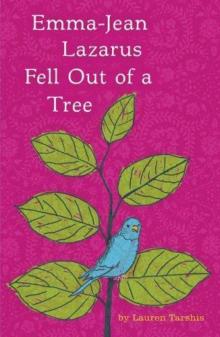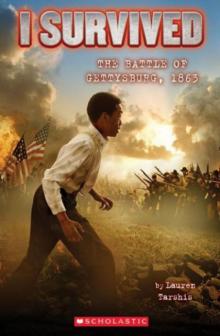- Home
- Lauren Tarshis
Emma Jean Lazarus Fell in Love Page 3
Emma Jean Lazarus Fell in Love Read online
Page 3
Emma-Jean went to her bedroom to put away her book bag and to get Henri from his cage. Then she followed the delicious smell of sautéed garlic and curry to the kitchen to say hello to her friend Vikram Adwani, the doctoral student in immunology who rented the sunny third floor of Emma-Jean’s house.
Vikram was standing at the counter, his lanky frame bent over the cutting board, his sleek black ponytail swinging rhythmically across his back as he chopped a red pepper into perfect squares. Emma-Jean was pleased to note that he was wearing the fine cotton sweater that Emma-Jean’s mother had knitted him for his recent birthday. It had been Emma-Jean’s idea to create a design with thirty-two stripes, one for each year of Vikram’s life.
“Hello my friend,” he said, smiling. “You are looking well.”
“Thank you,” Emma-Jean said, admiring her reflection in the shiny metal lid of Vikram’s rice pot. She looked quite healthy and vigorous, no doubt due to her balanced diet and bracing daily walks to and from school.
She stood next to Vikram as he chopped, relishing his familiar kitchen sounds—the whisper of the gas flames, the gentle rattling of the simmering pots, Vikram’s soft humming of a jazz melody he and Emma-Jean’s mother particularly enjoyed.
Henri fluttered up from Emma-Jean’s shoulder and settled on the top of Vikram’s head.
“You had an interesting day at school I hope?” Vikram said, offering the bird a small square of pepper, which was accepted with an enthusiastic peck.
“Of course,” replied Emma-Jean, who found every day with her peers interesting. “There is a dance coming up. It is causing a great deal of commotion among my friends.”
Vikram turned and looked at Emma-Jean, his thick eyebrows raised inquisitively.
“Will you be attending?” he asked.
Emma-Jean’s stomach lurched. She hesitated for just a moment before answering.
“No,” she said. “I will not.”
Vikram nodded as he lifted his cutting board and slid the peppers into a simmering skillet of ghee.
“I regret that I never had the opportunity to attend a dance,” he said.
Emma-Jean was not surprised to hear this. There had been little money or time for recreational pursuits in the Adwani household in Mumbai, India. Vikram’s parents had banked every spare rupee so that their hardworking son could realize their shared dream that he become a professor at a prestigious American university.
“Perhaps you and my mother will go to a dance,” Emma-Jean said, recalling how she had recently come upon Vikram and her mother dancing together in the living room. Vikram had moved with nimble steps as her mother twirled happily around him, her tinkling laughter adding bright notes to the music playing from the stereo.
“Perhaps the three of us will have the opportunity to attend a dance together,” Vikram said.
Emma-Jean and Vikram regarded each other.
It was hard to believe that it had been less than a year since Emma-Jean first met Vikram. He had responded to an advertisement Emma-Jean’s mother had posted in the university housing office, seeking a responsible and quiet person to rent the sunny third floor of their home. That had been just twenty-one months after Emma-Jean’s father’s car accident, when even the blades of grass in their yard had seemed to tremble with grief. Vikram had moved into their home with his set of well-used pots and skillets, a voluminous library of scientific books and journals, and an air of renewal that now permeated the house like the bright scent of cinnamon.
But it was not the memory of those early days that now filled Emma-Jean’s mind, but rather events surrounding a recent trip Vikram had taken to Mumbai. The trip had come about suddenly; Vikram’s mother had suffered a heart attack, and Vikram rushed to India to be by her side. Emma-Jean and her mother had driven him to the airport to catch his midnight flight.
Watching their lingering farewell embrace that night, Emma-Jean had the shocking realization that her mother had fallen in love with Vikram, and he with her. Emma-Jean had been deeply troubled by this, believing that her mother could have just one love of her life: Emma-Jean’s father.
But ten days later, on the morning of Vikram’s return, with the late-winter sun streaming through the windows and her mother’s laughter ringing through the house, Emma-Jean realized she had been wrong. A person could have more than one love in their lifetime. And if there was anyone in this world worthy of her mother’s love, surely it was Vikram Adwani.
“I believe we will do many things together,” Emma-Jean said now to her friend.
“I believe you are correct,” Vikram said.
Chapter 7
After wishing Vikram luck with his culinary endeavors, Emma-Jean went up to her room and sat down at her meticulous desk, which overlooked the dogwood tree she and her father had planted the spring before his accident. Henri fluttered to her shoulder and rested his velvety head against her cheek. Emma-Jean smiled, relishing one of her favorite parts of the day. Normally she would spend a sunny afternoon like this sketching the dogwood, which was in full bloom, or teaching Henri some words in Hindi.
But today there were pressing matters to attend to. She retrieved Colleen’s note from the zippered compartment of her schoolbag, carefully unfolded it, and studied it closely.
The paper itself was of the lined, three-hole variety that filled practically every binder at the school. The words were written in blue ballpoint pen. To the untrained eye, the note was no more remarkable than the scraps of paper Mr. Johannsen swept into his dustbin each afternoon.
But Emma-Jean’s eyes were honed from her years of observing. She knew that despite its humble appearance, this note, like a carved stone tablet unearthed from an ancient tomb, held mysteries from another world. And if the rites and rituals of seventh-grade boys were not as magnificent as those of Egyptian pharaohs and Roman emperors, they were just as intriguing to Emma-Jean.
And of course there was Colleen, a cheerful and generous girl most worthy of admiration. Emma-Jean could picture Colleen right now, sitting on her flowered bedspread, surrounded by her artfully arranged pink pillows and stuffed pigs, wearing her fluffy purple slippers and an expression of hopeful-ness. Suddenly the note in Emma-Jean’s hands felt heavier than it should, as though the paper itself were weighted with Colleen’s expectations, and Emma-Jean’s trepidations. What if Emma-Jean was not successful? What if, once again, she disappointed Colleen?
Emma-Jean closed her eyes and cleared these thoughts from her mind, replacing them with the bearded and bespectacled image of Jules Henri Poincaré, the legendary French mathematician who had been her father’s hero. Like Emma-Jean, the Frenchman had suffered setbacks in his problem-solving career, and yet he had never lost his optimism and his faith in the powers of creativity and logic to unlock the mysteries of the universe. Of course, Poincaré had studied celestial mechanics and chaos theory, not the relationships of seventh graders. But still, Emma-Jean felt the comparison was valid.
With renewed resolve, Emma-Jean opened her desk drawer and took out her father’s magnifying glass. The carved wooden handle felt warm, as though just moments before, her father had been holding it in his hand, peering at a bat skeleton or the underside of a mushroom cap.
She examined the paper through the glass, scanning slowly until she discovered an important clue. At the bottom of the paper were oily spots, tinted pale yellow, each made up of faint swirling circles; fingerprints, of course, very likely from food residue. It seemed the author had eaten an oily snack—a cheese-powdered chip or puff of some kind—and failed to wash his hands before writing the note. This was not surprising, given the poor personal hygiene endemic among the seventh-grade boys.
Another noteworthy detail was the odd squared-off shape of the index finger. Most likely the shape represented some sort of bandage. Perhaps the author had recently suffered a splinter or paper cut.
Emma-Jean put down the magnifying glass to record these observations in her notebook. But she paused as she wrote, struck by the positio
n of her hand on her paper, how she used the four fingers of her left hand to hold her paper steady as she wrote with her right. If Emma-Jean’s fingertips had been coated with an oily, yellow food substance, her own paper would be stained like Colleen’s note. But there was one critical difference. From the rise and fall of the fingers on Colleen’s note, Emma-Jean could see that the author had been holding the paper down with his right hand, not his left.
The author of the note was left-handed.
A surge of excitement came over Emma-Jean as the implications of this discovery became clear. Only ten percent of the human population is left-handed, which meant that out of the 103 boys in the William Gladstone seventh grade, only approximately ten could have written this note. It occurred to Emma-Jean, not quite incidentally, that this group did not include Will Keeler, who scrawled his barely legible script and performed his much-lauded basketball layup with his right hand.
Emma-Jean contemplated her next steps. Tomorrow she would identify the left-handed boys in the seventh grade. She would study their fingers for bandages and their lunch trays for bags of fried snacks. Of course she would be alert for longing looks cast in Colleen’s direction and suspicious activity in the vicinity of her locker.
Emma-Jean sat back in her chair with a feeling of satisfaction. Henri regarded her with his onyx-bead eyes.
“I have made excellent progress,” she told him, scratching him gently behind the head.
Indeed, her work had progressed more quickly than she had anticipated, and there was still time to sketch the dogwood tree.
But as she reached for her sketchbook, her hand went instead to her William Gladstone sixth-grade yearbook. Without exactly meaning to, she turned to page forty-two, where Will Keeler looked sleepily out from the right-hand corner. Emma-Jean studied the picture carefully. Once again, she experienced the odd fluttering in her heart.
What could it mean?
Emma-Jean wondered about this for some time. When she looked up from Will’s picture, she was astonished to discover that more than thirty minutes had passed. The dogwood tree was in shadow, and Henri was dozing contentedly on her shoulder. Emma-Jean closed the yearbook, gripped by a growing sense of alarm.
Something was happening to her, something that made no sense at all.
Chapter 8
Colleen was lying in her bed, smiling in the dark, thinking about how fun it would be to go to the Spring Fling with her boy. She thought about the dress she would wear—Long? Short? Sparkly? Twirly?—and if her mom would let her wear heels.
Oh, but her boy wouldn’t care about her shoes, would he? No, Colleen decided. Her boy wasn’t like that. He wouldn’t care if her hands got sweaty and she stepped on his feet when they danced. Her boy would just be happy that they were together.
Colleen turned over and smiled into her pillow. Thinking about her boy gave Colleen this new feeling. It wasn’t that she felt like a different person. It was the opposite of that. She felt like herself, only more—taller, braver, stronger . . .
Colleen-er.
Maybe this was how a peach felt when it was ripe, or how a brownie felt when it was all baked and ready to come out of the oven.
Even her mom had noticed the change.
“Is something going on?” her mom had asked when they were sitting in the den after dinner. Colleen was doing math and her mom was sewing Joseph and Mary sock puppets for her Sunday school class.
“Why are you asking that?” Colleen said, scared that maybe her mom had figured out that Colleen was putting on a little eye shadow when she got to school every morning. She’d wiped it off coming home on the bus, but maybe today she’d missed a spot.
“You’re just acting different,” her mom said, putting down her needle and reaching over to rest her hand on Colleen’s cheek, like she was checking for a fever. “Are you feeling all right?”
Colleen wanted to burst out in giggles. She was so much more than all right! She wanted to tell her mom about the note and her boy and the bird, how if you wished hard enough, anything could happen.
But her mother wasn’t a wishes-and-giggles type of person. Maybe she kind of used to be, when Colleen’s dad lived with them. But that was so long ago, Colleen couldn’t be sure.
“I’m doing fine, Mommy,” Colleen said. “I’m really, really good.”
And her mom seemed satisfied with that. She’d even smiled a little and nodded and said, “That’s nice.”
Colleen snuggled under her blanket and tried to fall asleep, but it was no use. She was too excited. And so finally she got up and sneaked across the hall to the guest room to call Kaitlin. That was one of the great things about having a best friend like Kaitlin. You could call her anytime, even at 9:50 on a Tuesday night.
“What’s wrong?” Kaitlin said in a worried voice.
“Nothing!” Colleen said. “I just couldn’t sleep.”
“Why not?” Kaitlin said.
“I’m just so happy, you know. . .” And then she just talked and talked and talked, about her boy and the note and how romantic it was, like Romeo and Juliet minus the dying at the end.
“Isn’t it so amazing?” Colleen said, closing her eyes, waiting for Kaitlin to exclaim, “Yes! It’s the best!”
But instead Kaitlin said, “Coll, it’s just a note,” which made a balloon inside Colleen go pop.
“What do you mean?” said Colleen.
“I’m saying you shouldn’t make this note into such a huge thing. So many boys like you, Coll! You need to just pick one and ask him to the Spring Fling. That’s what everyone else did.”
As always, Kaitlin sounded so sure, like when she was spelling a word or showing where Brazil was on a globe. Usually Colleen would just say okay, you’re right, even if she was pretty sure Brazil was nowhere near Japan.
But not this time.
“I would never do that!” Colleen said.
“Why not?”
“Because I want to find the boy who likes me!” she said.
“All the boys like you,” Kaitlin answered, which was really sweet but not true.
“But the boy who wrote this note really likes me! And Emma-Jean is going to help me—”
“Colleen!” Kaitlin interrupted. “Don’t you remember what happened the last time Emma-Jean helped you?”
She said helped in a mean Laura Gilroy way, like Emma-Jean was a big joke.
Colleen didn’t say anything. The phone felt hot in her hand. She could picture Kaitlin with her eyebrows all smooshed together, twisting one of her curls around and around and around on her finger.
Was this a fight?
Colleen wasn’t sure because she never fought with her friends. Never. Not even when Kaitlin invited Laura to go skiing instead of Colleen, and Colleen had been so hurt. Even then, Colleen had said, “Don’t worry!”
But this time Colleen couldn’t just back down. This was about her boy!
“For once something really great has happened to me,” Colleen said. “Can’t you be happy?”
“Oh Coll . . .” Kaitlin said. “I just want you to be happy.”
“Then be excited, okay?” She could hear her mom moving around downstairs and she needed to hurry back to bed. “Please?”
“Okay,” Kaitlin said, but she still didn’t sound sure.
“Love you,” Colleen said.
“Me too,” Kaitlin said. “You know that, right?”
“Of course!” Colleen answered.
Colleen said good-bye to Kaitlin. She felt better. She couldn’t blame Kaitlin for worrying. But this wasn’t like the last time Emma-Jean helped. And anyway, Colleen was so much Colleen-er now. Whatever happened, she could handle it.
Colleen went back to her room, but instead of getting into bed, she stood at her window and looked at the sky, which was so beautiful. Stars really did twinkle, just like in the song. Why hadn’t Colleen ever noticed before? Probably her boy noticed. Probably he was standing at his window right now, staring at the sky, thinking about Colleen, who wo
uld find him soon.
La, la, la
La, la, la
Chapter 9
After the dinner dishes were done and the floors were swept clean, Emma-Jean and her mother retreated to Emma-Jean’s mother’s bed to read and review the day’s events. It was a nightly ritual that began in the days following Emma-Jean’s father’s accident, when the bed had seemed like a tiny raft on a vast and turbulent sea. These waters had calmed in recent months, but neither Emma-Jean nor her mother was eager to give up their cozy evening routine.
Her mother had scarcely settled her head back on the pillows when Emma-Jean began telling her about Will Keeler. Her mother listened closely as Emma-Jean described in great detail the commotion of the Spring Fling and the frenetic vibrations of her heart whenever she saw Will.
“It is clear that Will is not suitable for me in any way,” Emma-Jean said. “And yet I find myself thinking about him even when I want to be thinking about other things.”
Indeed, she could not recall a single fact from her classes that day. She had concluded, however, that the arrangement of freckles on Will’s forearm closely resembled the constellation Virgo.
“Could it be,” Emma-Jean asked, her tone grave, “that I am suffering from spring fever?”
Her mother leaned close to Emma-Jean. A spiral of auburn hair had sprung free from its barrette, and it tickled Emma-Jean’s nose. It was a moment before her mother spoke.
“It is possible,” she said.
Emma-Jean sat back in her pillows and put her hand to her chest.
“But it is nothing to be concerned about,” her mother said, her voice briskly reassuring. “It is completely normal. It sounds like you might have a crush on Will.”
“A crush?” Emma-Jean said. This sounded very serious. She pictured a boa constrictor wrapped around the neck of a lemur.
“An infatuation,” her mother clarified.
“Is it the same as being in love?” asked Emma-Jean warily.
Her mother weighed the question, her eyes drifting over to her nightstand, where two framed photographs stood atop a neat stack of novels, financial reports from her job at the bank, and a Hindi dictionary she’d borrowed from Emma-Jean.

 I Survived the Battle of D-Day, 1944 (I Survived #18)
I Survived the Battle of D-Day, 1944 (I Survived #18) I Survived the Great Molasses Flood, 1919
I Survived the Great Molasses Flood, 1919 I Survived the Galveston Hurricane, 1900
I Survived the Galveston Hurricane, 1900 I Survived the San Francisco Earthquake, 1906
I Survived the San Francisco Earthquake, 1906 I Survived #4: I Survived the Bombing of Pearl Harbor, 1941
I Survived #4: I Survived the Bombing of Pearl Harbor, 1941 I Survived the Destruction of Pompeii, AD 79
I Survived the Destruction of Pompeii, AD 79 I Survived #1: I Survived the Sinking of the Titanic, 1912
I Survived #1: I Survived the Sinking of the Titanic, 1912 I Survived #5: I Survived the San Francisco Earthquake, 1906
I Survived #5: I Survived the San Francisco Earthquake, 1906 I Survived Hurricane Katrina, 2005
I Survived Hurricane Katrina, 2005 I Survived the Attacks of September 11th, 2001
I Survived the Attacks of September 11th, 2001 I Survived the Attack of the Grizzlies, 1967
I Survived the Attack of the Grizzlies, 1967 I Survived the Great Chicago Fire, 1871
I Survived the Great Chicago Fire, 1871 I Survived the Shark Attacks of 1916
I Survived the Shark Attacks of 1916 I Survived the Sinking of the Titanic, 1912
I Survived the Sinking of the Titanic, 1912 Emma-Jean Lazarus Fell Out of a Tree
Emma-Jean Lazarus Fell Out of a Tree I Survived True Stories: Five Epic Disasters
I Survived True Stories: Five Epic Disasters I Survived the Hindenburg Disaster, 1937
I Survived the Hindenburg Disaster, 1937 I Survived the Children's Blizzard, 1888
I Survived the Children's Blizzard, 1888 I Survived the Joplin Tornado, 2011
I Survived the Joplin Tornado, 2011 I Survived the American Revolution, 1776
I Survived the American Revolution, 1776 Emma Jean Lazarus Fell in Love
Emma Jean Lazarus Fell in Love I Survived the Battle of Gettysburg, 1863
I Survived the Battle of Gettysburg, 1863 I Survived the Japanese Tsunami, 2011
I Survived the Japanese Tsunami, 2011